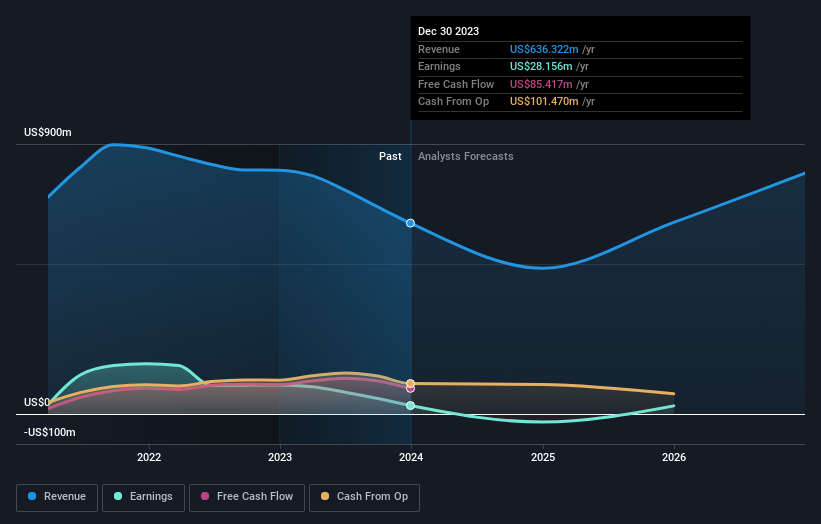Is It Too Late To Consider Buying Cohu, Inc. (NASDAQ:COHU)?
While Cohu, Inc. (NASDAQ:COHU) might not have the largest market cap around , it received a lot of attention from a substantial price movement on the NASDAQGS over the last few months, increasing to US$36.38 at one point, and dropping to the lows of US$30.55. Some share price movements can give investors a better opportunity to enter into the stock, and potentially buy at a lower price. A question to answer is whether Cohu's current trading price of US$30.86 reflective of the actual value of the small-cap? Or is it currently undervalued, providing us with the opportunity to buy? Let’s take a look at Cohu’s outlook and value based on the most recent financial data to see if there are any catalysts for a price change.
Check out our latest analysis for Cohu
What Is Cohu Worth?
The stock is currently trading at US$30.86 on the share market, which means it is overvalued by 22% compared to our intrinsic value of $25.33. This means that the opportunity to buy Cohu at a good price has disappeared! But, is there another opportunity to buy low in the future? Given that Cohu’s share is fairly volatile (i.e. its price movements are magnified relative to the rest of the market) this could mean the price can sink lower, giving us another chance to buy in the future. This is based on its high beta, which is a good indicator for share price volatility.
What kind of growth will Cohu generate?
Future outlook is an important aspect when you’re looking at buying a stock, especially if you are an investor looking for growth in your portfolio. Although value investors would argue that it’s the intrinsic value relative to the price that matter the most, a more compelling investment thesis would be high growth potential at a cheap price. However, with a negative profit growth of -4.0% expected over the next couple of years, near-term growth certainly doesn’t appear to be a driver for a buy decision for Cohu. This certainty tips the risk-return scale towards higher risk.
What This Means For You
Are you a shareholder? If you believe COHU should trade below its current price, selling high and buying it back up again when its price falls towards its real value can be profitable. Given the risk from a negative growth outlook, this could be the right time to de-risk your portfolio. But before you make this decision, take a look at whether its fundamentals have changed.
Are you a potential investor? If you’ve been keeping an eye on COHU for a while, now may not be the best time to enter into the stock. Its price has risen beyond its true value, on top of a negative future outlook. However, there are also other important factors which we haven’t considered today, such as the financial strength of the company. Should the price fall in the future, will you be well-informed enough to buy?
So if you'd like to dive deeper into this stock, it's crucial to consider any risks it's facing. To help with this, we've discovered 2 warning signs (1 makes us a bit uncomfortable!) that you ought to be aware of before buying any shares in Cohu.
If you are no longer interested in Cohu, you can use our free platform to see our list of over 50 other stocks with a high growth potential.
Have feedback on this article? Concerned about the content? Get in touch with us directly. Alternatively, email editorial-team (at) simplywallst.com.
This article by Simply Wall St is general in nature. We provide commentary based on historical data and analyst forecasts only using an unbiased methodology and our articles are not intended to be financial advice. It does not constitute a recommendation to buy or sell any stock, and does not take account of your objectives, or your financial situation. We aim to bring you long-term focused analysis driven by fundamental data. Note that our analysis may not factor in the latest price-sensitive company announcements or qualitative material. Simply Wall St has no position in any stocks mentioned.

